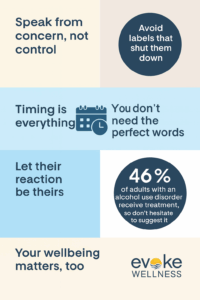When your child is in crisis, even basic conversations feel like landmines. You try to stay calm. You choose your words carefully. But deep down, you’re terrified—of saying too much, not enough, or exactly the wrong thing.
If your young adult child is drinking heavily, you might see things they can’t. Or won’t. Maybe they’re pulling away. Maybe they’re still high-functioning but something feels off. And maybe you’ve already tried talking and gotten nowhere.
This blog is for you. It’s not a script. It’s a guide to finding your footing—so you can speak with compassion, protect your relationship, and stay anchored in love.
Speak from Concern, Not Control
It’s easy to fall into a fixing mode: “You need to stop drinking.” “You’re ruining your life.” “If you don’t get help, you’re not welcome here.”
But leading with ultimatums almost always backfires. It pushes your child into defense mode and locks you into a power struggle.
Instead, try this:
“I’ve noticed you’ve been drinking more lately. I’m not here to lecture—I’m just worried. Can we talk?”
Notice the shift? It’s not about controlling their behavior. It’s about opening a door. You’re not threatening—you’re reaching.
Avoid Labels That Shut Them Down
Even if you’re convinced your child is struggling with alcohol addiction, avoid using labels like “alcoholic” unless they bring it up themselves.
Labels can feel final—like a verdict instead of an observation. And when someone’s not ready to hear it, they won’t respond with openness. They’ll pull away.
Use descriptive, nonjudgmental language instead. Think:
- “You haven’t been yourself.”
- “You’ve seemed checked out lately.”
- “I noticed you were hungover again. Are you okay?”
This keeps the conversation grounded in real-life moments—not abstract diagnoses.
Timing Is Everything
Don’t bring this up when they’ve been drinking, when emotions are high, or in the middle of an argument. You want a moment when things are relatively calm—when they’re sober, or at least clear-headed.
A walk, a drive, or a quiet moment at home can create space for real connection. Avoid “We need to talk” energy. Instead, let it be part of something natural.
And if it starts to go sideways? Pause. You can always return later. One imperfect but loving conversation is better than a perfectly timed one said in anger.
You Don’t Need the Perfect Words
Parents often ask: “But what do I say?” The truth is, your child won’t remember the script. They’ll remember how it felt.
You don’t need to nail the wording. You just need to show up with honesty and heart.
If you feel shaky, you can even say that out loud:
“This is hard for me to bring up. But I love you. And I can’t not say something.”
That kind of honesty breaks through. It’s not a confrontation—it’s connection.
Let Their Reaction Be Theirs
If they get defensive, angry, dismissive—or totally shut down—it doesn’t mean you failed. It means this is painful for them.
Try to stay steady, even if they lash out. Their reaction says more about their fear or shame than about your delivery.
You can offer a soft landing:
“I know this probably feels like a lot. I didn’t bring it up to make you feel bad. I just care.”
Give them space. Let the conversation breathe. Sometimes the real shift happens hours—or even weeks—after you speak.
What to Say About Alcohol Addiction Treatment
You might feel torn about suggesting treatment. You don’t want to sound like you’re giving up on them. But you also don’t want to ignore what’s happening.
Here’s a gentle way to plant the seed:
“There are programs out there that aren’t about punishment. They’re about getting help and having support.”
You can mention alcohol addiction treatment at Evoke Wellness Texas by name, especially if your child is local to San Marcos. Familiarity builds trust.
Let them know they’re not alone—and that good help exists nearby.
Your Wellbeing Matters, Too
Trying to support a loved one through addiction can drain you. It’s okay to admit this is hard. It’s okay to need your own support system.
You’re not failing by feeling exhausted. You’re human. Whether it’s Al-Anon, therapy, or simply talking to someone who’s been there—get support.
Because when you take care of your own emotional health, you show up stronger for the people you love.
Peer Quote
“I spent years walking on eggshells with my daughter. I wish someone had told me it’s okay to speak up with love—even if it shakes things up.”
– Parent, 2023
FAQs About Talking to a Loved One About Alcohol
What if they deny they have a problem?
That’s common. Denial is often a way of protecting oneself from shame or fear. You don’t have to argue or convince. Stick with your truth: “I’m seeing things that worry me. I just wanted to say it out loud.”
How do I know if it’s ‘just drinking’ or a real addiction?
You don’t need to figure that out alone. Changes in mood, slipping responsibilities, or drinking alone can all be red flags. Consider talking to a professional or reading more on what alcohol addiction looks like.
Can I make them go to treatment?
In most cases, no. But your words—and your boundaries—matter. You can’t force them to go, but you can influence them by showing care, concern, and offering resources.
Should I set boundaries around drinking in the home?
Yes, especially if their behavior is impacting your emotional or physical safety. Boundaries aren’t punishments—they’re about keeping relationships safe and healthy for everyone involved.
Is it better to write a letter instead of talking face-to-face?
Sometimes, yes. A letter can help you organize your thoughts and reduce emotional intensity. Just make sure the tone stays loving and calm—not accusatory.
Quick Tips for Parents Talking About Drinking
- Use “I” statements, not “you” accusations
- Choose a calm, quiet moment
- Don’t try to solve everything in one talk
- Offer resources, not ultimatums
- Stay steady, even if they get upset
You’re Not Alone—Even If It Feels That Way
If your child is struggling, it doesn’t mean you failed. It means they’re in pain. And it means you’re loving them through something they may not fully understand yet.
Don’t wait for a perfect time. Don’t wait until you feel totally ready. The most powerful conversations come from love, not perfection.
Ready to talk without walking on eggshells?
Call (888) 450-2285 or visit https://www.evokewellnesstx.com to learn more about our Alcohol Addiction Treatment services in San Marcos, Texas. We’re here to support you—and your family—every step of the way.



